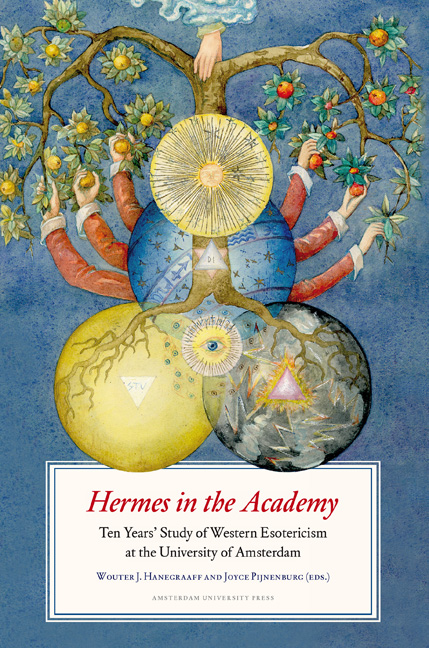Hermes and his Students in Amsterdam
Published online by Cambridge University Press: 20 January 2021
Summary
Joost R. Ritman (founder of the library), Esther Oosterwijk-Ritman (general director and librarian) and the board and staff of the Bibliotheca Philosophica Hermetica (BPH) would like to extend their warmest congratulations to the Center for the History of Hermetic Philosophy and Related Currents of the University of Amsterdam (GHF) on the occasion of its tenth anniversary.
Over the last ten years, the BPH has seen its number of visitors increase; naturally, the presence of GHF has been a contributing factor to this. Students come to the library to study for papers or presentations, and lecturers at GHF regularly organize tours for their students. In general, the public awareness of our common field of interest has grown. It was fortunate that the GHF's foundation committee decided to establish the center in Amsterdam. The city was a major center in the history of Hermetic philosophy and related currents (especially in publishing) in the 17th century; at present it is developing into a focal point of expertise in Hermetic historiography.
In the context of this celebration I will briefly outline the library's collection, with a particular focus on rare books and terra incognita: items of special interest for the historiography of Hermetic philosophy and related currents. I will also devote a few words to the BPH's research institute and publishing house.
Bibliotheca Philosophica Hermetica
Joost R. Ritman, who founded the Bibliotheca Philosophica Hermetica in 1957, was presented with a 17th-century edition of the Aurora of Jacob Boehme on his 23rd birthday in 1964, a gift which inspired him to collect early printed books and manuscripts and to gradually build a library that thematically corresponded to his interests as a Rosicrucian. In the following decades, this library grew into a substantial collection of resources in the field of Christian Hermetic gnosis. The library opened its doors to the public in 1984 and has remained “Hermetically open” to anyone interested in this field, from general readers to scholars and students. Modern books (post-1800), reference works, and secondary literature can be consulted on the open shelves. The pre-1800 books and manuscripts can be studied upon request.
- Type
- Chapter
- Information
- Hermes in the Academy , pp. 149 - 156Publisher: Amsterdam University PressPrint publication year: 2009



